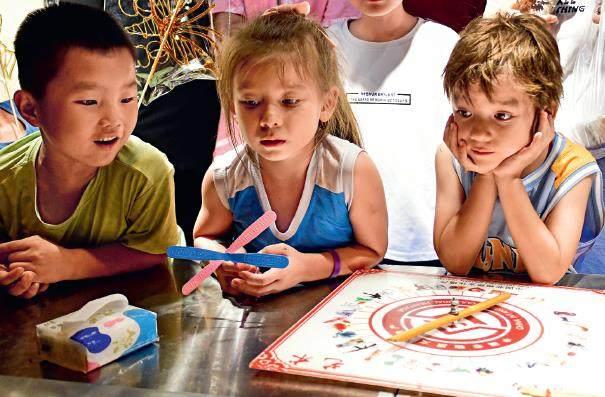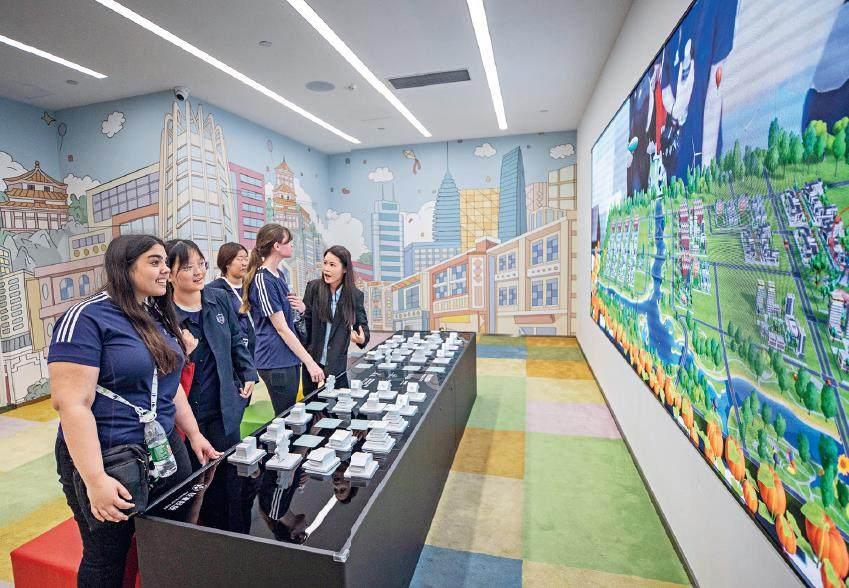Youth Exchanges Bring Countries Closer
LI GANG


All kinds of youth exchanges are playing a keyrole in advancing communication and mutuallearning among civilizations.
FRIENDSHIPS which are derived from closecontact between people of different countrieshold the key to opening up soundstate-to-state relations. Public diplomacy isan important part of a countrys overall diplomaticendeavors. It helps countries navigate across sensitiveissues to improve international relations, enhanceamity, and facilitate cooperation. As ChinesePresident Xi Jinping once said, “Friendship betweenpeoples is a fundamental driving force for worldpeace and development, and an essential preconditionfor win-win cooperation.”
A prominent example of public diplomacy in recenthistory was the Ping-Pong diplomacy of 1972,which thawed Cold War tensions between thePeoples Republic of China and the United States.That exchange between young people used as a keycomponent of public diplomacy greatly benefitedthe personal growth of the participants, helpeddevelop state-to-state relations, and enhancedpeople-to-people bonds between China and theU.S.
In his reply to a letter from students of a Hungarian-Chinese bilingual school in Hungary last year,President Xi Jinping encouraged Hungarian youngpeople to learn more about China and becomeenvoys of the China-Hungary friendship.
In January of this year, a delegation from the U.S.state of Utah made a cultural exchange-themedvisit to Beijing and Shanghai, where they touredthe Palace Museum and Fudan University. Theywere introduced to icons of traditional Chineseculture, such as chime bells, paper-cutting, andPeking Opera. During the same month, a group ofstudents from Columbia University in the City ofNew York visited Beijing and Chengdu, where theywere warmly received by local people. They wereimpressed by Chinas long history and rich culture,as well as the vitality of the countrys economy andsociety.
In March, China invited 24 students from theLincoln High School Tacoma and Steilacoom HighSchool in Washington State to visit China underthe Young Envoys Scholarship program.
Personal Benefits
Participants in international exchanges alwayscome away more enlightened, having broader horizonsand enhanced cultural sensitivity. Becausesuch activities often require the use of a foreignlanguage, they also help young people improvetheir linguistic and communication skills.
As Chinas economic strength continues togrow, it has built closer economic and trade tieswith other countries. Mastering the Chinese languageis now a big plus when a candidate appliesfor jobs at some multinationals. This has led to astronger interest in learning Chinese around theglobe.
At present, more than 180 countries havelaunched Chinese language education programs,84 countries have incorporatedChinese language into their nationaleducation systems, andmore than 4,000 universitieshave set up Chinese languagedepartments, majors or courses.Tens of thousands of youngpeople from more than 100countries have been invited toChina through programs suchas the “Chinese Bridge” summercamp, and more can learn Chinese and experienceChinese culture through online activities.
When young people areaway from their parentson international exchangeprograms, they becomemore independent anddevelop greater autonomy.
When young people are away from their parentson international exchange programs, they becomemore independent and develop greater autonomy.In exchange tours, children are divided up intoteams and must cooperate and interact with peersfrom different backgrounds, during which theydevelop interpersonal relationships and teamworkskills.
According to Madelyn Ross, president of theU.S.-China Education Trust, the trips of U.S.young people to China not only help them learnthe Chinese language and culture, but also openup more opportunities for their future careerdevelopment.
Fekete, who also goes by his Chinese name MaHongbo, studied at a Hungarian-Chinese bilingualschool in Hungary before he was enrolled into theYuanpei College of Peking University in Beijing.Studying at the bilingual school brought him moreopportunities in later life, he said. He was gratefultoward the Chinese teachers there, and hoped thathe could follow their example in contributing toChina-Hungary friendship in the future.
From January 3-12, 2024 a group of studentsfrom the Columbia University traveled to the Chinesecities of Beijing, Chengdu, and Shenzhen. InChengdu, capital of Sichuan Province, they touredthe Research Base of Giant Panda Breeding, the ancientirrigation system Dujiangyan, and the StateKey Laboratory of Rail Transit Vehicle System runby the Southwest Jiaotong University. This experiencegave these students a broad view of Chinesehistory, culture, economy, and society. WilliamSimuku, of the Gen Z, said he and other membersof the American delegation had extensive discussionswith their Chinese peers, and gained a betterunderstanding of each other in the process. Henow had first-hand and profound knowledge aboutChina.
Boosting China-West Relations
People-to-people exchanges are playing a significantrole in promoting the healthy development ofChina-U.S. and China-Europe relations. There aredifferences between China and the West concerningvalues and ideology, which are often a sourceof misunderstanding and mistrust between them.People-to-people contact, including that betweenthe youth, is conducive to building true friendship.
First, youth exchanges help enhance mutualunderstanding and friendships. By participating inexchange programs, young people can experiencefirst-hand the culture, history, and social system ofother countries. This enables them to better understandthe differences and similarities that existbetween them, build mutual understanding thathelps reduce miscomprehensions and prejudices,and promote international peace and cooperation.
Second, international exchanges help youngpeople foster an international vision and develop abroader mindset. By studying, living, and workingwith peers from different countries, young peoplecan improve their cross-cultural communicationand problem-solving skills. Participants in youthexchange programs today may become the drivingforce behind the development of China-U.S. andChina-Europe relations tomorrow.
Third, youth exchanges also promote cooperationin other fields. During international exchanges,young people from different countries are able toestablish long-term friendships, which results infacilitating cooperation and exchange in the fieldsof culture, education, science, and technology.
In January of this year, President Xi replied to aletter he received from Sarah Lande, a friend of hisin the U.S. state of Iowa. In his reply, he announceda plan to invite 50,000 young people from the U.S.to China over the next five years, and expressedhis hope that more American young people couldcome to see, hear, and experience life in China forthemselves, so that they could have an accurate,multidimensional, and panoramic view of China,thus enabling them to serve as bridges of friendshipbetween the two peoples.
In March this year, Beijing welcomed studentsfrom the U.S. and Germany. On March 17, 24 studentsfrom the Lincoln High School Tacoma andSteilacoom High School in Washington State arrivedin the Chinese capital. From there they wenton to Shiyan in Hubei Province and Guangzhouand Shenzhen in Guangdong Province. Yuti Thakoretold the media she was thrilled to receive theinvitation from President Xi, and shared the newswith all her friends while counting the days todeparture.
On March 28, Peng Liyuan, wife of President XiJinping, met with representatives of the studentsand teachers from the Chinese Choir of the BurgGymnasium, a German high school, at Beijing No.35 High School. Since its founding 10 years ago, thechoir has inspired young Germans to learn aboutChinese culture through singing in Chinese, andthereby enhanced the friendship between the twocountries. One of its members Johanna said that insinging Chinese songs she improved pronunciationand tones, and got closer to Chinese culture. “Whenwe sing together, the song, like a bridge, connects twolanguages and two culture. It is exciting,” she said.
Educational Cooperation
Cooperation and exchanges in education arecritical for mutual learning and understandingamong civilizations. Schools and educationalprograms jointly operated by China and othercountries provide the youth convenient access tointernational education, facilitate the disseminationof knowledge, spur innovation in education,and promote exchanges of different cultures.Educational exchange programs bring youngpeople together from different parts of the world,help them build bonds, and break down socialmisconceptions. As a result, a social foundationis laid for healthy relations between their countriesof origin.
Educational cooperation is an important manifestationof Chinas opening-up. With about 1.3million Chinese studying abroad, China has become the worlds largest source of internationalstudents. It has also founded 1,500 institutionsof learning with foreign partners. One of themis the Duke Kunshan University established in2013 in the city of Kunshan in Jiangsu Province.As of January of 2024, the university has receivedapplications for its undergraduate programfrom 4,705 students in 123 countries around theworld, a year-on-year increase of 41 percent.About half of the applications come from theU.S. Dr. John Quelch, executive vice chancellor ofthe university, believes that more students fromthe U.S. and other countries will apply for universitiesin China as China and the U.S. intensifyeducational cooperation and exchanges.
Participants in youthexchange programstoday may become thedriving force behind thedevelopment of China-U.S.and China-Europerelations tomorrow.
Through studying, working, and travelingabroad, and participating in overseas programs,Chinese young people are pursuing deeperintegration with the world and showing greaterrationality, inclusiveness, self-confidence, andself-reliance to the world.
According to the Youth of China in the NewEra , a whitepaper released by the InformationOffice of Chinas State Councilin April 2022, China sent justover 800 students abroad in1978. In 2019, more than 700,000Chinese students went abroadto pursue further education.Over the past four decades, thetotal number of Chinese peoplestudying abroad has exceeded6.5 million. The number of Chinesereturning to China afterfinishing their study grew from248 in 1978 to more than 580,000 in 2019, andtheir total number has exceeded 4.2 million overthe past four decades and more.
Various types of youth exchanges in all formsare playing a key role in advancing communicationand mutual learning among civilizations.They contribute to the personal growth of theindividuals involved and also the amity betweentheir countries.

